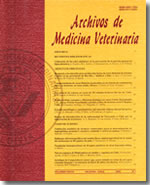Importance of oxidative stress in cattle: its relationship with the physiological condition (pregnancy and parturition) and nutrition
Main Article Content
Abstract
Oxygen involved in the oxidation of substrates to produce energy in normal metabolic processes can produce oxygen radicals, also called reactive oxygen species (ROS). Although low levels of ROS are essential in a plethora of cellular processes, accumulation of ROS may damage biological macromolecules. Therefore, the body is protected by a wide range of antioxidants systems. The detection of ROS damage and how the body protects itself against them is becoming very important in the practice of clinical human medicine, unfortunately it is less common in veterinary medicine. The objectives of this review work are i) to illustrate some aspects of oxydative status, ii) analyze the influence of oxidative stress on bovine health in relation to the physiologycal condition (pregnancy and parturition) and nutritional management and iii), to organize the literature, which could be interesting in veterinary medicine and about this matter, in a accesible form.

